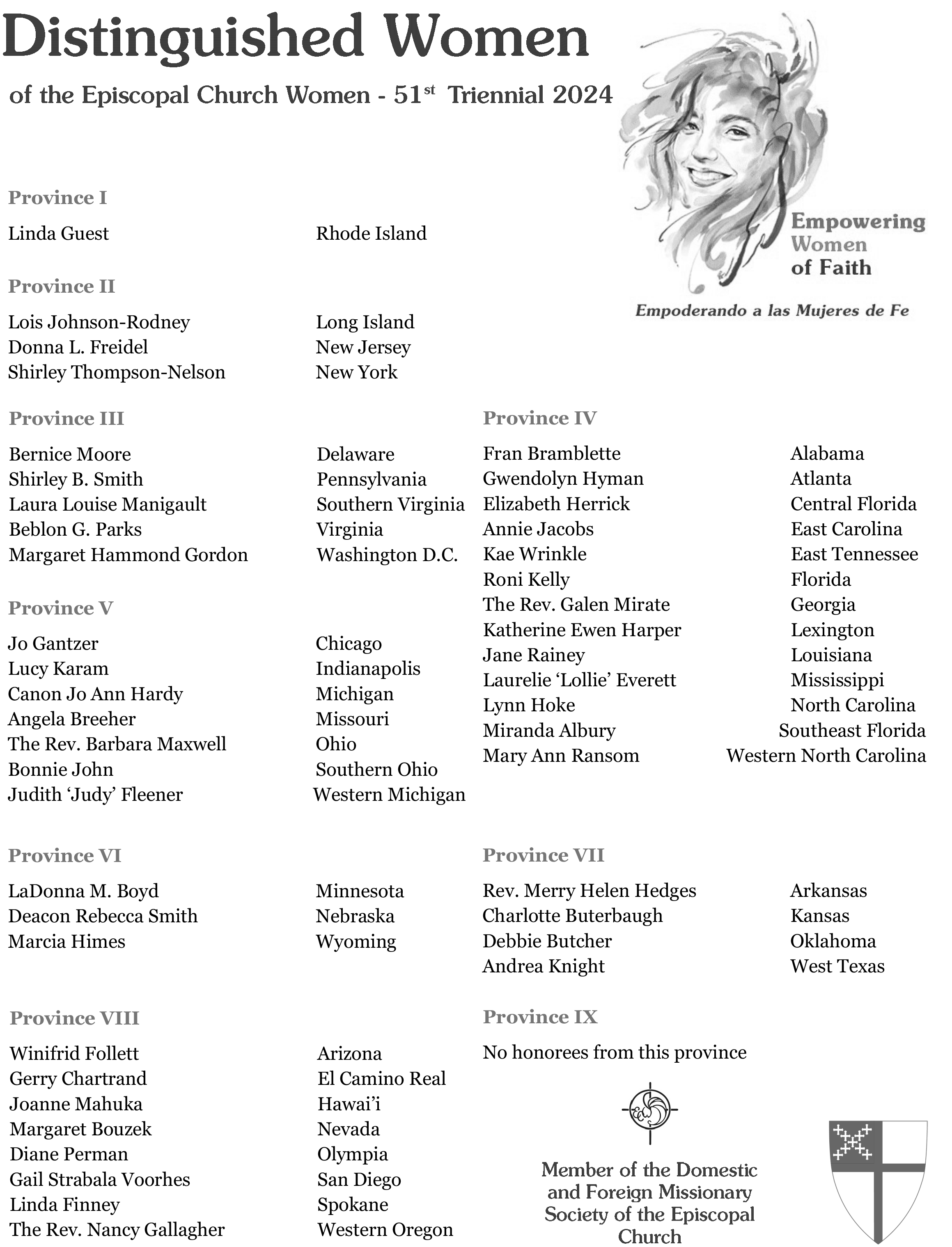Lynn Hoke Named Distinguished Woman
The Episcopal Church Women of the Diocese of North Carolina are pleased to announce the selection of Lynn Ramsay Hoke as their “Distinguished Woman” to be honored, along with others from throughout the wider church, on June 25th, during the ECW Triennial Meeting in Louisville, KY. Lynn currently serves as Diocesan Archivist for the Episcopal Diocese of North Carolina.
Lynn’s Biography
A native of Oklahoma, Lynn Ramsay Hoke joined the Episcopal Church through the Canterbury House ministry at Southern Methodist University. Following graduation, she was a seminary spouse on the campus of the Episcopal Theological School (later Episcopal Divinity School). While in Cambridge, Lynn earned a Masters in Regional Studies–Soviet Union from Harvard University, then worked as a Research Assistant at Harvard’s Kennedy School of Government. These pursuits solidified her lifelong affinity for researching, documenting, and presenting information on myriad topics, especially history.
As a young clergy wife in Arkansas, Lynn discovered the “church history” trail around 1978 by helping celebrate the 25th anniversary of St. John’s Church in Harrison. While at St. John’s, she was active in parish and diocesan ECW activities. After election as diocesan ECW Christian Education Chair, but before that term began, the Hoke family was relocating to St. Andrew’s Church in Amarillo, Texas.
Amarillo provided two significant history research opportunities, with 100th anniversaries for both the city (1987) and St. Andrew’s Church (1989). After a few Radio-TV classes at Amarillo College, Lynn joined a small faculty team that secured local grants and produced an 8-hour television series and Companion Guide entitled “Faces of Amarillo, 1887-1987.” Lynn helped arrange more than 200 audio- and videotaped interviews and also logged and fact-checked all the recorded stories.
For the St. Andrew’s centennial celebration Lynn created a booklet with history, photos, and documentation for multiple church-activity lists and participants. She also wrote a separate ECW history entitled, “YOU’VE COME A LONG WAY BABY!” written in the “voice” of St. Andrew’s Church itself, and concluding:
“My women have been generous over the years – seeing needs in their midst and meeting them: keeping my interior lovely, landscaping my property, supplying my kitchen, making my nursery attractive and safe. This generosity reaches out into the community: meeting pressing needs, supporting mission work at home and abroad, helping seminarians, stocking the pantry, contributing to the clergy discretionary funds. They are a faithful bunch, my women, and I salute them this day!”
A family move to St. Francis, Houston, offered Lynn new history opportunities, including courses in Public History at the University of Houston, an introduction to Archives through a six-week internship at NASA, and a two-year project organizing the Baylor College of Medicine Archives.
The Hokes next moved in 1995 to The General Theological Seminary and Lynn became the administrative assistant for two Canons at the Episcopal Diocese of New York. On a part-time and weekend basis she also organized the personal papers of AA and Al-Anon founders, Bill and Lois Wilson, at Stepping Stones in Westchester County. She also helped coordinate the Manhattan Episcopal Church Archivists group, which met periodically to tour both archival collections and interesting church spaces.
Lynn’s friendship with Mary Donovan – from Arkansas days in the early 1980s – provided a connection to the archivist at Grace Church, who needed some part-time help creating a searchable computerized “finding aid.” This job led to a connection with Prof. Kenneth T. Jackson of Columbia University, who brought his history graduate students to Grace Church to consider the “original research” possibilities of church collections. When Dr. Jackson became President of the New-York Historical Society shortly after the 9/11 attack, he recruited Lynn to be his Executive Assistant.
Following a solo move in 2004 to Raleigh, North Carolina, Lynn joined The Church of the Good Shepherd, where she met Lisa Towle, then-Diocesan ECW President (and later National ECW President). In a chance conversation at the Fall 2006 Annual Meeting, Lynn discovered that the Diocesan ECW was searching for an Archivist to organize a small collection of unprocessed materials dating back to its 1882 organization as the Diocesan Woman’s Auxiliary. The ECW had a small fund earmarked for the project and Lynn agreed to accept this short-term position. She credits the ECW totally with providing the direct pathway into her current position as Archivist of the Episcopal Diocese of North Carolina. As it turned out, her work for the ECW was almost finished when more than 625 boxes of diocesan archives suddenly needed immediate attention – as in total relocation and considerable processing after a 16-year gap with no archivist on diocesan staff.
In addition to archival organization and research for the diocese, Lynn collaborates closely with the Diocesan Historiographer, the Rev. N. Brooks Graebner, Ph.D. In 2009 they began offering what became annual spring “History Days.” Co-sponsored by the ECW, the first History Day commemorated the Bishop Tuttle Memorial Training School (1925-1941), a largely unknown National Woman’s Auxiliary-funded initiative to train young Black women as professionals in church work and social work. In 2010 they successfully initiated the diocesan Charter Committee on History & Archives.
While serving as Secretary of the national Episcopal Women’s History Project (2009-2012), Lynn helped organize the 2011 conference in Seneca Falls, NY, “Making Do, Getting It Done.” Conference logistics included a “surprise” celebration for the guest speaker, Dr. Mary Sudman Donovan, in observance of the 35th publication anniversary of her seminal book, A Different Call: Women’s Ministries in the Episcopal Church 1850-1920.”
During the six-year leadup to the tri-diocesan statewide Diocesan Bicentennial in 2017, Lynn helped “mine” both diocesan and ECW records to produce Diocesan Convention and Annual ECW Meeting exhibits and publications, along with six spring History Days, two in each of North Carolina’s three dioceses. She continues archival processing, responding to research requests, coordinating events, and helping churches develop local “History Keepers” for preserving their own records.
A large – and growing – collection of ECW and diocesan history documents can be found online: https://www.episdionc.org/in-depth-history/
